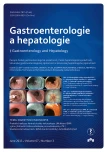-
Medical journals
- Career
Current position and future trends of therapy in ulcerative colitis
Authors: M. Lukáš
Authors‘ workplace: Klinické a výzkumné centrum pro střevní záněty, ISCARE I. V. F. a. s. a Ústav lékařské biochemie a laboratorní diagnostiky 1. LF UK a VFN v Praze
Published in: Gastroent Hepatol 2013; 67(3): 212-218
Category: IBD: Review Article
Overview
In the last 20 years there has been significant progress in both the pharmacotherapy and surgical therapy of inflammatory bowel diseases, including Crohn’s disease and ulcerative colitis. In patients with ulcerative colitis, aminosalicylates represent the fundamental part of the treatment. Aminosalicylates can be used orally, locally or in combination. At least 30 to 40% of patients with ulcerative colitis require therapy intensification, which consists of glucocorticoids, immunosuppressants and biological therapy. The major indication for biological therapy is a cortico-dependent or cortico-refractory course of the disease, or patients who have failed to respond to immunosuppressive therapy. Infliximab was introduced to the clinical practice in 2006 for the treatment of ulcerative colitis patients and there is significant and long-term experience with this drug. A short-term positive response to infliximab was detected in 80–90% treated patients. Beside the innovation and introduction of new medicines, a novel approach for the future is based on newly emerging therapeutic concepts. The first is based on selection of patients with ulcerative colitis who are at risk, and initiating early aggressive therapy before structural damage in the large bowel occurs. The second is focused on close monitoring of inflammatory activity beyond the symptoms (treat to target concept).
Key words:
ulcerative colitis – biological therapy – infliximab
Sources
1. Mařatka Z. Colitis ulcerosa. Praha: Česká grafická unie 1948.
2. Lukas M, Bortlik M, Maratka Z. What is the origin of ulcerative colitis? Still more questions than answers. Postgrad Med J 2006; 82(972): 620–625.
3. Burish J, Duricová D. Incidence of IBD and diagnosis in Europe-firts results from EPICOM study. UEGW Amsterodam 2012. Dostupné z: http://www.e-learning.ueg.eu.
4. Lakatos L, Lakatos PL. Is the incidence and prevalence of inflammatory bowel diseases increasing in Eastern Europe? Postgrad Med J 2006; 82(967): 332–337.
5. Stange EF, Travis SP, Vermeire S et al. European evidence-based Consensus on the diagnosis and management of ulcerative colitis: Definitions and diagnosis. J Crohns Colitis 2008; 2(1): 1–23.
6. Levine A, Griffiths A, Markowitz J et al. Pediatric modification of Montreal classification for inflammatory bowel disease: the Paris classification. Inflamm Bowel Dis 2011; 17(6): 1314–1321.
7. Schroeder KW, Tremaine WJ, Ilstrup DM. Coated oral 5-aminosalicylic acid therapy for mildly to moderately active ulcerative colitis. A randomized study. N Engl J Med 1987; 317(26): 1625–1629.
8. D´Haens G, Sandborn WJ, Feagan BG et al. A review of activity indices and efficacy end points for clinical trials of medical therapy in adults with ulcerative colitis. Gastroenterology 2007; 132(2): 763–786.
9. Van Brandse J, Wildenberg M, de Bruyn JR. Fecal loss of infliximab as a cause of lack of response in severe inflammatory bowel disease. DDW 2013, Orlando.
10. Torres J, Billioud V, Sachar D et al. Ulcerative colitis as a progressive disease:the forgotten evidence. Inflamm Bowel Dis 2012; 18(7): 1356–1363.
11. Bessissow T, Lemmens B, Ferrante M et al. Prognostic value of serologic and histologic markers on clinical relapse in ulcerative colitis patients with mucosal healing. Am J Gastroenterol 2012; 107(11): 1684–1692.
12. Bortlík M, Ďuricová D, Kohout P et al. Doporučení pro podávání biologické terapie u idiopatických střevních zánětů: 2. vydání. Gastroent Hepatol 2012; 66(1): 12–22.
13. Rutter M, Saunders B, Wilkinson K et al. Severity of inflammation is a risk factor for colorectal neoplasia in ulcerative colitis. Gastroenterology 2004; 126(2): 451–459.
14. Ng SC, Kamm MA. Therapeutic strategies for the management of ulcerative colitis. Inflamm Bowel Dis 2009; 15(6): 935–950.
15. Plevy SE, Targan SR. Future therapeutic approaches for inflammatory bowel diseases. Gastroenterology 2011; 140(6): 1838–1846.
16. Pariente B, Cosnes J, Danese S et al. Development of the Crohn´s disease damage score, the Lémann score. Inflamm Bowel Dis 2011; 17(6): 1415–1422.
17. Danese S. New therapies for inflammatory bowel disease: from bench to the bedside. Gut 2012; 61(6): 918–932.
Labels
Paediatric gastroenterology Gastroenterology and hepatology Surgery
Article was published inGastroenterology and Hepatology

2013 Issue 3-
All articles in this issue
- News in digestive endoscopy
- Quality control of colonoscopy in daily practice – experience from Beskydy Gastrocentre
- Multiband mucosectomy in the treatment of early spinocellular carcinoma of the esophagus
- Digestive endoscopy unit at Agostino Gemelli University Hospital, Catholic University of Rome: study stay insights
- Nitrergic innervation of small intestine in rats after ischemic-reperfusion injury
- Faecal incontinence
- Current position and future trends of therapy in ulcerative colitis
- Overview of case studies in 2013
- Report on endoscopic workshop ISCARE 2013
- 8th ECCO Congress in Vienna
- ESGE + ESDO workshop, Lisbon 2013: tribute to Maratka, quality of endoscopy and new approaches in the management of upper GI neoplasias
- XVII. Hradec gastroenterology and hepatology days and 7th international endoscopic workshop
- Asacol 800™ mg tablets
- Health risks of endoscopy for endoscopists in the Czech Republic – a pilot study
- Gastroenterology and Hepatology
- Journal archive
- Current issue
- Online only
- About the journal
Most read in this issue- Faecal incontinence
- Asacol 800™ mg tablets
- Current position and future trends of therapy in ulcerative colitis
- Health risks of endoscopy for endoscopists in the Czech Republic – a pilot study
Login#ADS_BOTTOM_SCRIPTS#Forgotten passwordEnter the email address that you registered with. We will send you instructions on how to set a new password.
- Career

